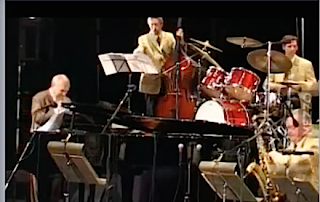https://www.youtube.com/watch?v=7NLcGLTieEo
DON ELLIS
Upstart
Live in 3 2/3 /4
Don Ellis wrote and arranged in unusual meters, and yet was able to make each composition swing. He’d drive home the time signature to his audience by providing for congas, timbales, cowbell and three double basses to repeat the meter in an ostinato fashion. And of course the whole band would get into the action, accenting where appropriate to achieve 5, 7, 11, 13 or 19 beats to the measure. Eventually the trumpeter would step in and improvise over that kind of swinging, repetitive motion.
One piece on this latest reissue, "Upstart," was written in 3 2/3 /4, or 11/8 time. Like Paul Desmond’s "Take Five," Ellis’ compositions seem natural and yet place an extra beat here or there to swing a little differently than most music. Your fingers and toes take over and your mind forgets that it’s supposed to be complex. Ever try jogging in 5/4? It takes some of the accented stress off your lead foot and evens things out. Ellis’ piece is counted 3-3-3-2 with the fourth pulse being only two-thirds of the others. Thus, the meter can be interpreted as three and two-thirds beats per measure. The piece with the awkward-looking title drives firmly with the band stating its meter throughout. A long trumpet solo, while not Ellis’ best work, serves to remind us how easily the brilliant artist could keep your feet tapping and your head nodding – to a different drummer – while improvising freely.
The album’s first three tracks were recorded October 10, 1966 at the Pacific Jazz Festival in Costa Mesa, south of Los Angeles. All the rest, including an alternate version of "Freedom Jazz Dance," were recorded several months later at Shelly’s Manne-Hole in L.A. The reissue, whose final five titles are listed as bonus tracks, totals 75 minutes altogether. The 1966 material includes a lovely, soulful "Angel Eyes" ballad that Ellis treats with respect while adding his personal touch: dissonance among the sections, a long bowed double bass drone, and his dramatic featured trumpet. Both versions of "Freedom Jazz Dance" run in 7/4 with a loose, Eddie Harris soul-jazz, blues feeling. Tom Scott performed at the 1966 date, but not the ’67 date; so his saxello solo line was replaced by Joe Roccisano on alto. The alternate version swings a little faster, looser and better all around. Hank Levy’s "Bossa Nueva Nova" and Jaki Byard’s "One Note" were never released before now. Performed live with Don Ellis announcing each selection, these two big band sessions reveal the unpredictability of the leader’s work while unleashing both his "school" of improvisation and his tasteful style.
Track Listing: Orientation; Angel Eyes; Freedom Jazz Dance; Barnum
Personnel: Don Ellis, Glenn Stuart, Alan Weight, Ed Warren, Bob Harmon- trumpet; Dave Wells, Ron Myers, Dave Sanchez- trombone; Terry Woodson- bass trombone; Ruben Leon- alto sax, soprano sax, flute; Joe Roccisano- alto sax, soprano sax, flute, clarinet; Tom Scott- alto sax, saxello, flute; Ira Shulman, Ron Starr- tenor sax, flute, clarinet; John Magruder- baritone sax, flute, clarinet, bass clarinet; Dave Mackay- piano; Ray Neapolitan, Frank De La Rosa, Chuck Domanico, Dave Parlato- bass; Steve Bohannon- drums; Alan Estes- drums, timbales; Chino Valdes- congas, bongos; Mark Stevens- percussion.









































